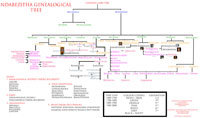 View the Ndabezitha Genealogical Tree
View the Ndabezitha Genealogical Tree
Madhlangala Dukuza Ndabezitha, the son of Dukuza, was born on 19 July 1879 at the Noodsberg Mission Station in the County of Victoria, Colony of Natal (now KwaZulu-Natal). Ndabezitha completed his primary education at the Sidumbini Mission Station in the Colony of Natal and his secondary schooling at the Lovedale Institution in the Cape Colony. In 1903, he qualified as a teacher in the Native Schools (as it was then called) of the Colony under the Natal Education Department and in 1905 became a Head Teacher at a school in the Colony under the auspices of the Natal Education Department.
In 1909, he married KaMakhanya and they had seven children (two daughters and five sons), who are all deceased. In 1941, he was widowed and in 1944 Ndabezitha married Ntombinkulu Bhengu a former Principal of Maquza Primary School, Umzinto, Natal. They had three children, Mabandla, Khangekile (1948-2011) and Nomadhlangala.
Between 1906 and 1938, Ndabezitha managed schools as a Head Teacher in the Native Schools in the Province of Natal. Between 1914 and 1920, Ndabezitha studied extramural Political Science Courses at the South African School of Mines and Technology, now the University of Witwatersrand.
Ndabezitha’s political involvement is evident from 1907 when he worked closely with South African Native National Congress (SANNC) Presidents General, Dr Langalibalele John Dube and later Chief Albert Mvumbi John Luthuli in the Province of Natal in opposing colonialism and segregation. He was a Member of the Natal Native Congress, in 1910, which opposed the formation of the Union. In 1912, he was one of the founding members of the South African Native National Congress (SANNC) later named the African National Congress (ANC).
In March 1913, Ndabezitha was a delegate to the SANNC Annual Conference, which campaigned against the Native Land Act of 1913. At this conference, a deputation was appointed to present African objectives to the Government in Cape Town. He was part of the team that advised Dr W. B. Rubusana on how to formulate a letter to Lord Gladstone asking him not to agree to the Bill until he had heard African views. Lord Gladstone was the British President General of South Africa at the time.
On 5 July 1913, he was a delegate to an SANNC meeting in Johannesburg, which was specifically called to receive a report from the delegates to Cape Town and to further consider what other actions might be taken. That report arose from the conditions created by the Native Land Act. Presiding at that meeting was Dr J.L Dube, R.S. Msimang, S. Plaatje and Dr Rubusana who informed the meeting about the delegates’ four interviews with members of Parliament and that all their efforts failed.
In 1913, Ndabezitha was an SANNC Financial Committee Member in Johannesburg which was formed to take charge of funds raised to pay for travelling and other expenses of the SANNC delegation to England in mid 1914. They were going to inform the British public how British South Africa conceded power to a White Parliamentary majority in the 1910 Union of South Africa and to request for British assistance to abrogate the obnoxious law, The Native Land Act of 1913.
From 1919 to 1928, he was a founding member of a workers organisation. From 1939 onwards, Ndabezitha settled and worked in Durban. He became a Foreman and Shop steward of the workers at Payne Brothers’ stores in Durban. Later in 1954, he moved to Port Shepstone where he opposed Shepstone’s policy. Due to the ‘Shepstone policy’ Ndabezitha was banished to a Bantu Reserve (as it was then known) called KwaDweshula.
In 1954, he applied for a sole proprietor of business licence and was declared a General Hawker under the Firms Act of 1906 by the Rural Licensing Board for the Area of Port-Shepstone.
On 8 February 1958, Madhlangala Dukuza Ndabezitha died and was buried in a dense bush of the American Board Mission Station Church yard, KwaDweshula at Port-Shepstone. This was to preserve and protect his remains from the notorious Apartheid regime’s bitterness towards him while still alive.
On 4 June 2009, Ndabezitha’s grave was located by his daughter; Nomadhlangala through the assistance of the Zamisa and Gumbi families, the American Board Church [now the United Congregational Church of South Africa (UCCSA)] and elders who witnessed his death and were present at his funeral in 1958
Meli, F. (1988), A History of the ANC - South Africa Belongs To All Of Us|Comrade M.D. Ndabezitha Family Archives: This biographical material was supplied by M.D. Ndabezitha’s daughter Nomadhlangala Ndabezitha.